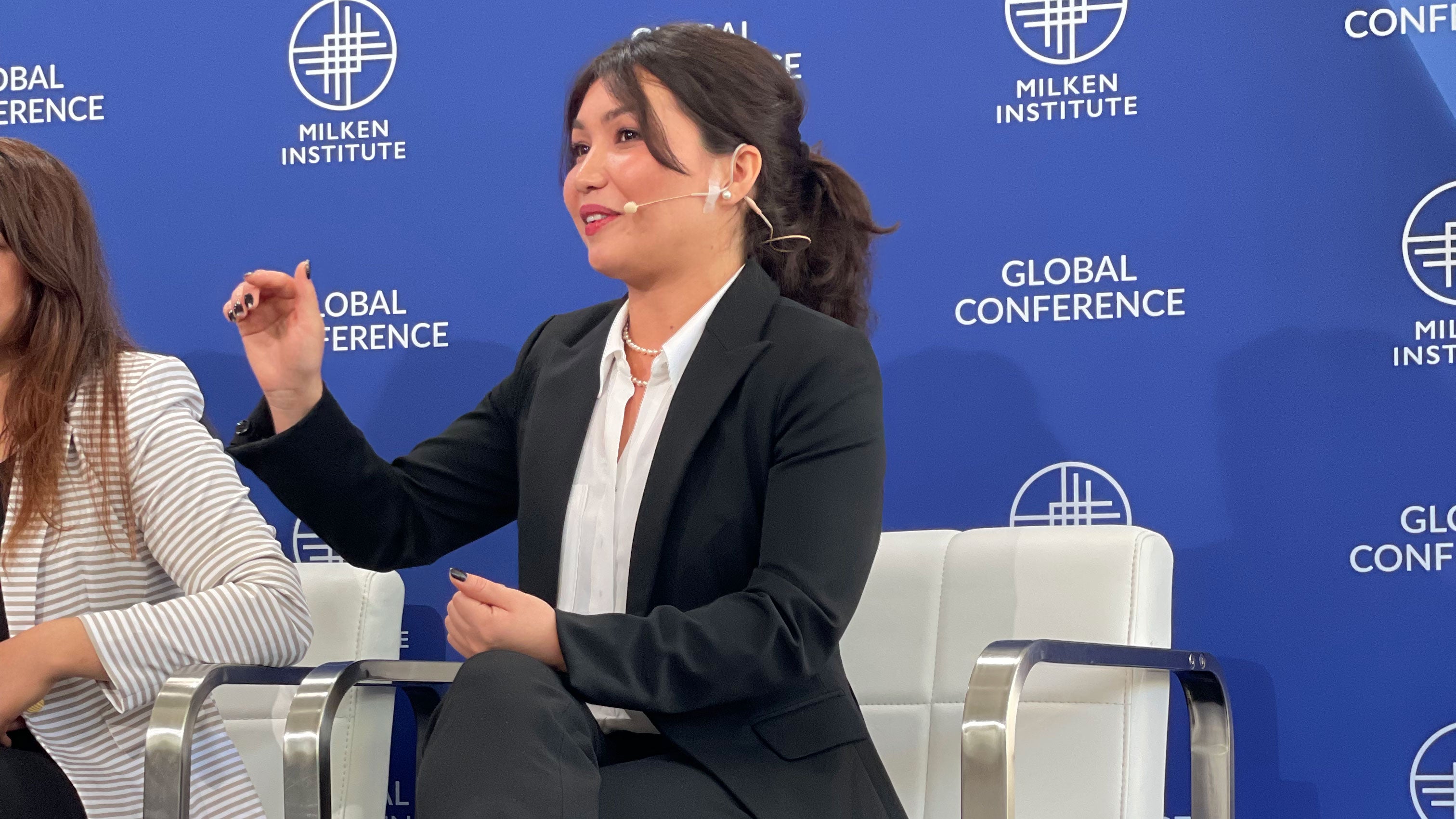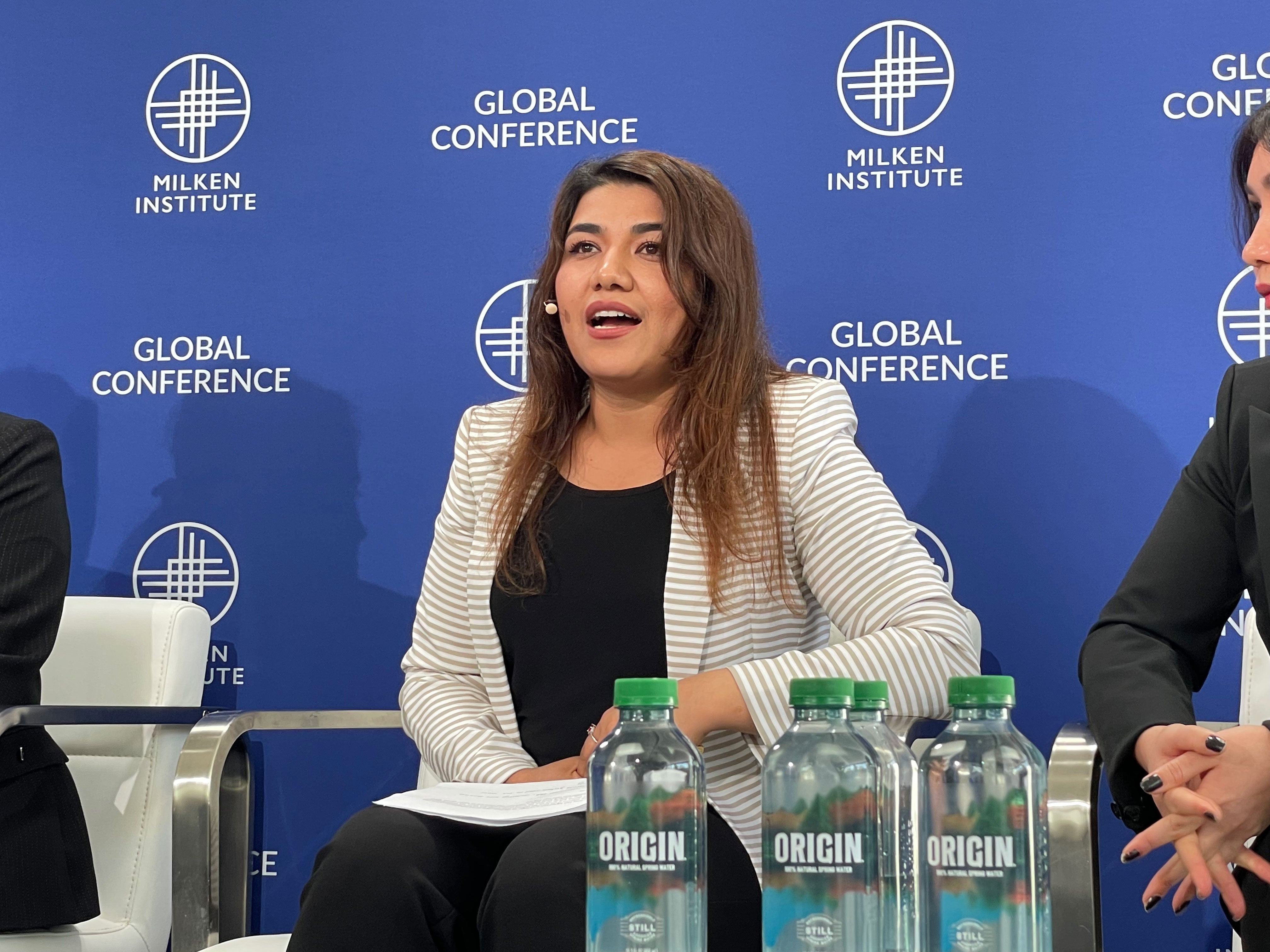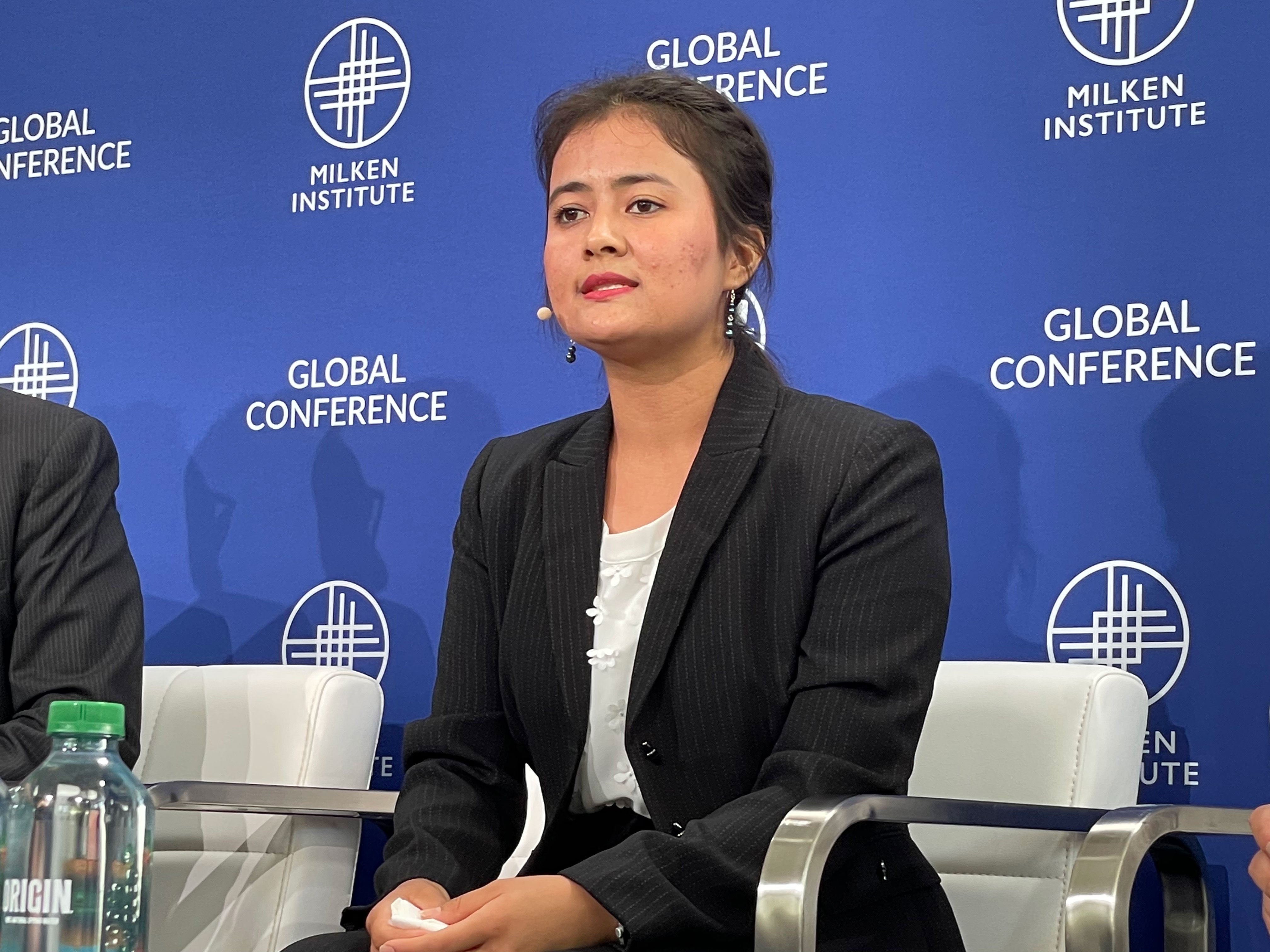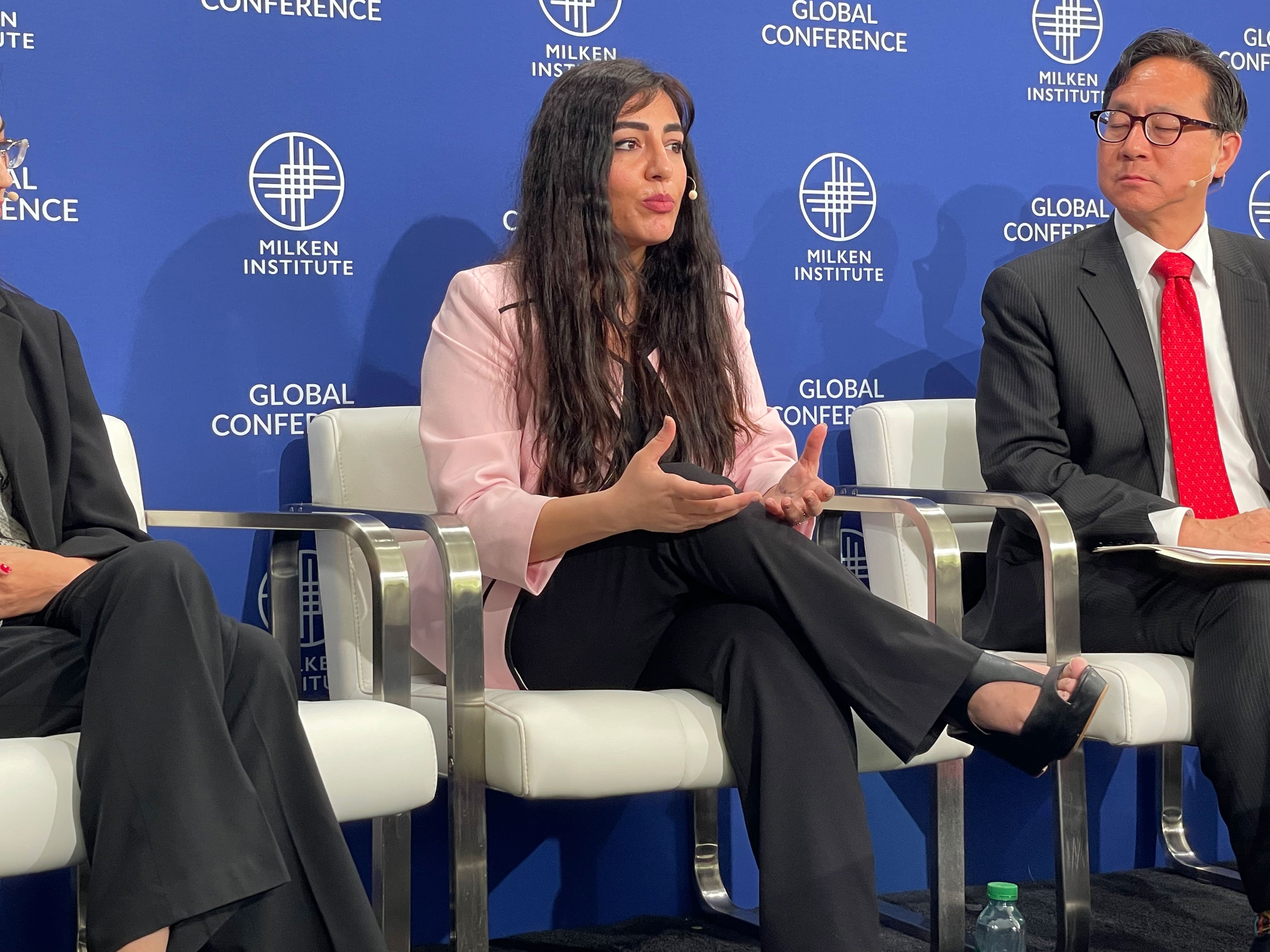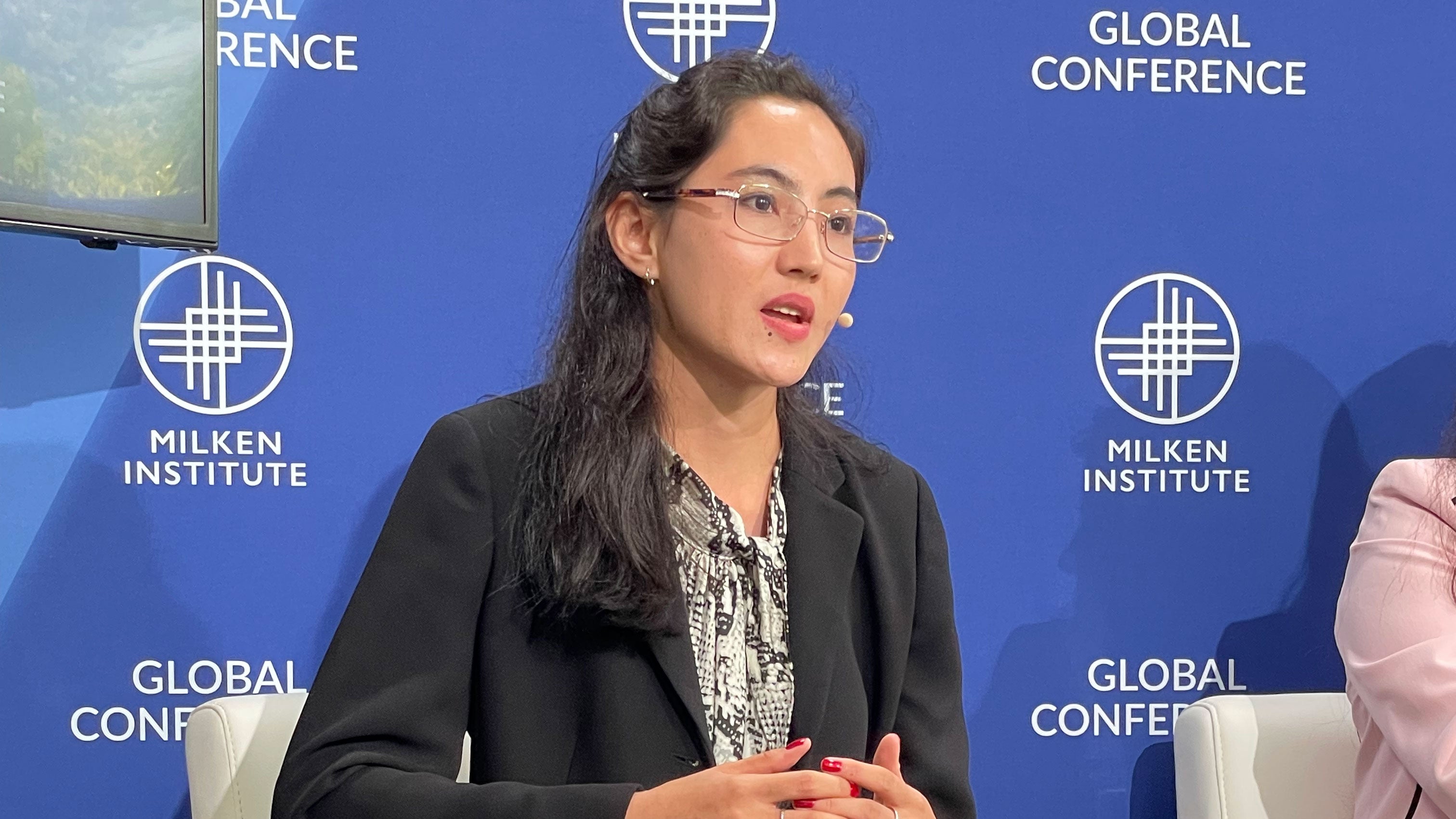Five Arizona State University students who are refugees from Afghanistan described the difficulty of their lives right now, balancing their opportunity at a stable future with their fear for the families they left behind.
The five women, among more than 60 who came to ASU in December, a few months after a harrowing escape from Kabul, spoke at the Milken Institute Global Conference in Los Angeles on Wednesday. The Milken Institute, a nonprofit, nonpartisan think tank that helps people pursue education and employment, is supporting ASU’s initiative to help the women. The institute’s staff was personally invested in the situation because one of the students, Humaira Zafari, had been an intern with the institute two years ago.
The women, who were students or alumni of the Asian University for Women, are still transitioning to life at ASU, taking English classes and figuring out their educational paths.
Here are excerpts from the students’ remarks at the event:
Humaira Zafari
Humaira Zafari has a bachelor’s degree from the Asian University for Women and will pursue a master’s degree at ASU. Photo courtesy the Milken Institute
It was on the 15th of August, 2021, when the capital city of Afghanistan collapsed and thousands of people were running toward the airport to flee the country. We knew the Taliban and we knew their story and we knew in the future there would be no education and no career, so we were wishing to get out of that country.
We tried three times. The first attempt was so difficult. There were thousands of people running to the airport. It was so chaotic, the situation.
For the second attempt, for 40 hours we were inside seven buses. And we could not enter because explosions happened near the airport that made it harder for us to pass the Taliban checkpoints.
We did not lose our hope. We went for the third time and finally made it.
So when the Taliban escorted us inside to the terminal and handed us to the U.S. military soldiers, personally, I felt in my homeland like a hostage and it was so hard. What if this the last time I’m seeing my homeland?
Finally on Sept. 1, we come to the United States. In the very first weeks, it was difficult. They were not prepared for such a huge group of people. We were waiting for one meal for three hours in the line.
Finally, despite all those challenges, we heard the good news that all of us got full scholarships at 10 different universities in the United States. Fortunately, the majority of us got accepted at ASU.
Right on the day we arrived, we had a placement test, and all of us were involved in English proficiency classes, and now we are almost done. Half of us already graduated from those English classes.
Farahnaz Walizada
Farahnaz Walizada has a bachelor’s degree from the Asian University for Women and will pursue a master’s degree in global management at ASU. Photo courtesy the Milken Institute
It was really hard for us to leave our families behind and come to the United States alone. But we had no choice. In order to save ourselves, we left them behind.
They are living under the Taliban rule. The sad stories you’re hearing in the news are all true. Our families are living in uncertainty and insecurity. There is great danger for them to be there and the Taliban is threatening them because of us.
The sad news is that our sisters cannot attend school beyond primary school because the Taliban banned schools. If girls can’t be educated, that girl won’t be employed, that girl will never have financial stability and will have limited options for the future. The only hope now is marriage at a young age, which will have a terrible outcome for our sisters.
And there are financial pressures on our families. Most of the girls were the breadwinners of their families and now they are not. Most of our parents worked for the government or international NGOs and now they are no longer working and they are jobless. It’s very hard for us to support them with the limited resources we have.
We know the attention of the world has changed from Afghanistan to another site, but we would like for the world leaders to know that there are 35 million people, including our beloved families, that we left behind. We hope the leaders of the world will help our families and those in the crisis right now.
Fahima Sultani
Fahima Sultani won a full scholarship to the Asian University for Women. Photo courtesy the Milken Institute
Due to the Taliban takeover in August 2021, Afghanistan has been enduring a deepening and deadly humanitarian crisis. Literally no one is investing in Afghanistan because everyone is afraid, because the future is uncertain.
Everyone just wants to get out of the country for a brighter future.
Due to that, severe poverty is going on. Early marriage cannot be prevented any more because the parents cannot feed the family of seven or more than seven people.
When it comes to the education crisis, well-qualified teachers have already left the country. When it comes to the girls, they cannot get out of their homes to pursue their studies. When it comes to boys and men, when they are going to school, explosions are happening at their schools, education centers and medical clinics.
We are living in the 21st century. Education is a fundamental human right that has been taken away from millions of Afghan girls.
On May 8, 2021, there was an explosion at a high school. Almost 85 people were killed and over 240 were wounded. Me personally, when I would go to the memorial where they were buried, I could barely walk. I felt my legs shaking. I could bare(ly) breathe. Once they were educators, once they were leaders, once they were human rights activists and now they were in their graves.
Tahmina Raoufi
Tahmina Raoufi is an aspiring actress, a career that was very difficult to pursue in Afghanistan. Photo courtesy the Milken Institute
The first memory I have of that day, Aug.15, was I was in the office and my supervisor came running and asked all the female staff to leave for home, followed by the male staff.
As we were leaving, I knew something was not right but I wasn’t sure, because at that point, nothing was for sure. They asked us to immediately take down all of our social media accounts and remove any political posts we had in the past, which is exactly the first thing I did.
But I feared it meant one thing – suppressing our voices.
Of course I was desperate because I wanted the whole world to know what was happening in Afghanistan. And I wanted to know if we were being left alone or if people were standing up for us in solidarity.
So I logged back into my Facebook every now and then. I was scared. I didn’t want to log in, but I also didn’t want to stay quiet if I had a way of communicating.
I also searched and Googled a lot of international news agencies to see if they were covering the news in Afghanistan. For some time, I did feel grateful because there was some coverage of the reality on the ground, but unfortunately, the attention of the world got divided.
Then came a lot of pictures of women dressed head to toe in black hijabs, and they were shown in parliament. And suddenly, a new kind of narrative directly or indirectly insinuated that these are Afghan women and they are supporting this new government and that is the government they want. But that is not the case. That government came from coercion and it didn’t come from the choice of the people. So it can never represent the people’s voice.
But I would like to take a minute to acknowledge the positives that came out of the crisis. And we are living examples of that — 60-plus women who got full scholarships at Arizona State University.
I’m a living example. When I was in Afghanistan, I wanted to pursue acting and shift my career to a different field, but I didn’t have those opportunities. The good thing is that when we came to the U.S. and Arizona, we were well taken care of, we received laptops and all kinds of technical support. We saw that it has 1,300-plus majors and we could actually make decisions about our future.
Mina Mushtaq
Mina Mushtaq will pursue a bachelor's degree in global management at ASU. Photo courtesy the Milken Institute
For Afghan women, education restored their ability to work and be self-reliant and achieve their dreams, but unfortunately, they have lost all that.
Right now, Afghan women are fighting back to restore their rights to get an education, work and have equal opportunities. I know women who are running secret schools and study groups in Afghanistan, and this is a sign of the resistance toward the Taliban regime and their ideology.
As a citizen of the world, I ask each and every one of you to help Afghan women to have access to education and to put pressure on the Taliban and do not recognize the Taliban as the government of Afghanistan.
What you can do for us as global citizens is to give us opportunities such as mentorship, fellowships and jobs. That can help us, empower us and give us the opportunity to give back to our communities in Afghanistan as well as here in the U.S. and around the world.
Top image: Five ASU students described their lives as refugees from Afghanistan in a panel discussion moderated by Curtis Chin, Milken Institute Asia Fellow and former U.S. Ambassador to the Asian Development Bank. Photo courtesy the Milken Institute
More Arts, humanities and education

ASU professor's project helps students learn complex topics
One of Arizona State University’s top professors is using her signature research project to improve how college students learn science, technology, engineering, math and medicine.Micki Chi, who is a…

Award-winning playwright shares her scriptwriting process with ASU students
Actions speak louder than words. That’s why award-winning playwright Y York is workshopping her latest play, "Becoming Awesome," with actors at Arizona State University this week. “I want…

Exceeding great expectations in downtown Mesa
Anyone visiting downtown Mesa over the past couple of years has a lot to rave about: The bevy of restaurants, unique local shops, entertainment venues and inviting spaces that beg for attention from…



